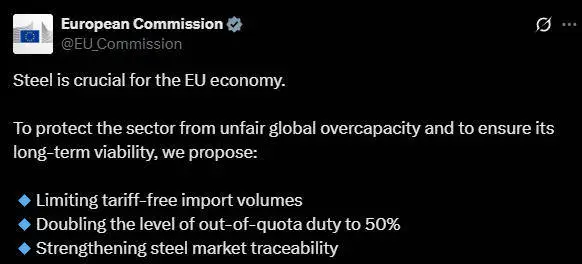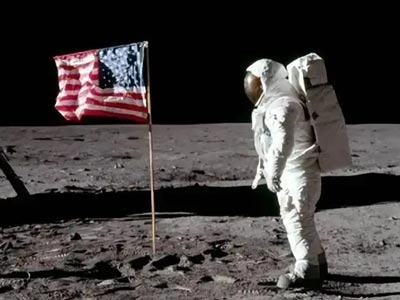The EU is following the US and Canada in taking action against imported steel – imposing tariffs.
On October 7th, the European Commission announced that, to protect the EU from "unfair global overcapacity," it will begin limiting duty-free steel imports next year, cutting the import quota in half – with an additional 50% tariff imposed on any excess.
The Financial Times and Euronews reported that the EU did not directly name China, but the move was undoubtedly aimed at China. However, according to the BBC, the British steel industry is collectively wailing, saying the move could lead to its "greatest crisis ever."
The European Commission announced...
According to its website, the Commission has put forward a proposal comprising three measures: limiting duty-free imports to 18.3 million tons per year, a 47% reduction compared to the 2024 steel quota; doubling the out-of-quota tariff level to 50%; and strengthening traceability in the steel market by introducing melting and pouring requirements to prevent circumvention.
The Commission claims that the proposed measures are fully WTO-compliant and are "aimed at protecting the EU steel industry from the unfair effects of global overcapacity and a key step in ensuring the long-term viability of this strategically important industry."

X screenshot
The Commission also stated that it will engage with affected EU trading partners, in accordance with WTO rules, and may offer them "country-specific steel import quotas" in the future.
According to reports, the proposal must be approved by the European Parliament and the 27 EU member states. If approved, the latest proposal will replace the existing steel sector safeguard system, which expires in June 2026.
The Hong Kong-based South China Morning Post noted that the proposal did not name China, stating that tariffs and quotas would apply to global imports. However, an anonymous EU official declared that "China is by far the biggest problem" for the EU steel industry.
Euronews stated that the measure targets China and other countries. EU officials stated that in 2024, the main suppliers of EU steel products were Turkey, India, South Korea, Vietnam, and China. The Financial Times also recently cited sources as saying that the EU was about to take action against Chinese steel.
At a press conference that day, EU Trade Commissioner Maros Sefcovic hinted that further investigations into China's trade practices were underway. He declared that the EU is focusing on other sectors most affected by trade fluctuations, saying, "If necessary, we will take action in other sectors as well."
He pointed out that the EU steel industry lost 18,000 jobs in 2024, saying, "We must stop this."
The EU has long been planning to target China.
The EU denies that this move is imitating the US and Canada. However, US President Trump already imposed a 50% tariff on imported steel. The Canadian government also recently imposed import restrictions on countries with which it does not have a trade agreement.
"We are not playing Trump politics... The European steel industry is on the brink of collapse," said EU industry chief Serjeant. "We are protecting the steel industry so that it can invest, decarbonize, and become competitive again." Serjeant, along with Sefcovic, denied that the EU is implementing protectionist policies, insisting that the EU "does not like tariffs and tariff policies."
According to Eurofer, the European Steel Industry Association, the EU will import 28 million tons of steel in 2024, accounting for a quarter of total sales. This import volume is double the volume in 2012/13, when China became the main exporter.
Furthermore, due to US President Trump's tariff policy, the EU expects its annual steel exports to the US to be significantly reduced by 3.8 million tons. France and 10 other EU member states, including Italy and Spain, hope to introduce "melting and pouring" rules similar to those in the US to prevent Chinese steel from entering the EU market through third countries, bypassing tariffs.
Reuters quoted analysts as predicting that China's steel exports are expected to hit a record high this year, with growth ranging from 4% to 9%, and total exports could reach 115 million to 120 million tons.
The Financial Times previously noted that even before Trump imposed a 50% tariff on EU steel exports to the US earlier this year, the European steel industry was already struggling under competition from Chinese imports and high energy prices. Trump's tariffs on other countries have also raised concerns that more low-priced steel products will flood the EU from the US market.
Since early September, under pressure from high-quality, low-cost Chinese products and Trump's high tariffs, some European steelmakers have urged Brussels to impose US-style tariffs on all imported steel products, warning that the industry faces the risk of collapse.
Regarding China-EU relations, China has consistently stressed that China's development and openness bring opportunities, not risks, to Europe and the world. Protectionism cannot solve the EU's problems; it protects against backwardness and undermines the future. China and the EU are each other's second-largest trading partners and are important forces in building an open world economy. Specific economic and trade issues should be resolved through dialogue and consultation.
British industry laments: Biggest crisis ever
"EU steel tariff hike threatens British industry, 'The UK steel industry faces its biggest crisis ever,'" the BBC reported on the 7th, noting that the EU is the most important export destination for British steel, worth nearly £3 billion and accounting for 78% of the UK's overseas market share.
The article stated that Trump's high tariffs had already severely impacted British companies, plunging several into serious financial crisis. The EU's latest move was "another heavy blow" to the British steel industry.
When asked about the UK's concerns at a press conference on the 7th, Sefcovic responded that he expected to "fully participate" in discussions with the UK on the issue. The BBC reported that he hinted at the possibility of future negotiations to determine specific UK quotas.
On the same day, British Prime Minister Starmer, who had already departed for India, responded that the government would provide "strong support" to the UK steel industry. He said, "I'll tell you more later, but as you might expect, discussions are ongoing," but declined to provide any details.
The UK Department for Business and Trade said in a statement that it was "urging the European Commission to urgently clarify the impact of this move on the UK." "Protecting trade flows between the UK and the EU is vital, and we will work with our closest allies to address global challenges, not add to our industry's woes," UK Industry Secretary Chris McDonnell pledged in a statement. "We will continue to explore stronger trade measures to protect UK steelmakers from unfair practices."
The UK government said the industry secretary will meet with steel industry representatives on the 9th to discuss their concerns.
Gareth Street, director general of British Steel, urged the government to "fully leverage our trading relationship with the EU to secure UK national quotas," otherwise the industry could face "disaster." He warned that the EU's latest "deadly" measures, once implemented, will pose an "existential threat" to British steel companies and the industry.
"This is undoubtedly one of the biggest challenges we have faced in a long time," said the head of a British stainless steel products company, noting that EU countries are the company's main export market and that future trade with EU customers is now a concern.




